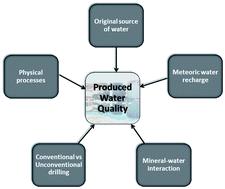当前位置:
X-MOL 学术
›
Environ. Sci.: Processes Impacts
›
论文详情
Our official English website, www.x-mol.net, welcomes your
feedback! (Note: you will need to create a separate account there.)
Understanding controls on the geochemistry of hydrocarbon produced waters from different basins across the US
Environmental Science: Processes & Impacts ( IF 4.3 ) Pub Date : 2020-12-15 , DOI: 10.1039/d0em00388c Shikha Sharma 1, 2, 3, 4 , Vikas Agrawal 1, 2, 3, 4 , Rawlings N. Akondi 1, 2, 3, 4 , Yifeng Wang 4, 5, 6 , Alexandra Hakala 4, 7, 8, 9
Environmental Science: Processes & Impacts ( IF 4.3 ) Pub Date : 2020-12-15 , DOI: 10.1039/d0em00388c Shikha Sharma 1, 2, 3, 4 , Vikas Agrawal 1, 2, 3, 4 , Rawlings N. Akondi 1, 2, 3, 4 , Yifeng Wang 4, 5, 6 , Alexandra Hakala 4, 7, 8, 9
Affiliation

|
The most massive waste stream generated by conventional and unconventional hydrocarbon exploration is the produced water (PW). The costs and environmental issues associated with the management and disposal of PW, which contains high concentrations of inorganic and organic pollutants, is one of the most challenging problems faced by the oil and gas industry. Many of the current strategies for the reuse and recycling of PW are inefficient because of varying water demand and the spatial and temporal variations in the chemical composition of PW. The chemical composition of PW is controlled by a multitude of factors and can vary significantly over time. This study aims to understand different parameters and processes that control the quality of PW generated from hydrocarbon-bearing formations by analyzing relationships between their major ion concentrations, O, H, and Sr isotopic composition. We selected PW data sets from three conventional (Trenton, Edwards, and Wilcox Formations) and four unconventional (Lance, Marcellus, Bakken, and Mesaverde Formations) oil and gas formations with varying lithology and depositional environment. Using comparative geochemical data analysis, we determined that the geochemical signature of PW is controlled by a complex interplay of several factors, including the original source of water (connate marine vs. non-marine), migration of the basinal fluids, the nature and degree of water–mineral–hydrocarbon interactions, water recharge, processes such as evaporation and ultrafiltration, and production techniques (conventional vs. unconventional). The development of efficient PW recycle and reuse strategies requires a holistic understanding of the geological and hydrological history of each formation to account for the temporal and spatial heterogeneities.
中文翻译:

了解美国不同盆地碳氢化合物产出水的地球化学控制
常规和非常规碳氢化合物勘探产生的最大废物流是采出水(PW)。与含高浓度无机和有机污染物的PW的管理和处置相关的成本和环境问题,是石油和天然气行业面临的最具挑战性的问题之一。由于需水量的变化以及PW化学成分的时空变化,当前许多PW的再利用和回收策略效率低下。PW的化学成分受多种因素控制,并且会随时间变化很大。这项研究旨在通过分析主要离子浓度,O,H和Sr同位素组成之间的关系,了解控制含烃地层产生的PW质量的不同参数和过程。我们从具有不同岩性和沉积环境的三个常规(特伦顿,爱德华兹和Wilcox地层)和四个非常规(兰斯,马塞勒斯,巴肯和Mesaverde地层)油气层中选择了PW数据集。通过比较地球化学数据分析,我们确定了PW的地球化学特征受多种因素(包括原始水源(原生海洋)Marcellus,Bakken和Mesaverde地层)具有不同岩性和沉积环境的油气地层。通过比较地球化学数据分析,我们确定了PW的地球化学特征受多种因素(包括原始水源(原生海洋)Marcellus,Bakken和Mesaverde地层)具有不同岩性和沉积环境的油气地层。通过比较地球化学数据分析,我们确定了PW的地球化学特征受多种因素(包括原始水源(原生海洋)与非海洋相比),盆地流体的运移,水-矿物质-烃相互作用的性质和程度,补给水,蒸发和超滤等过程以及生产技术(常规与非常规)。有效的PW回收和再利用策略的发展要求对每个地层的地质和水文历史有一个整体的了解,以解决时间和空间上的异质性。
更新日期:2021-01-06
中文翻译:

了解美国不同盆地碳氢化合物产出水的地球化学控制
常规和非常规碳氢化合物勘探产生的最大废物流是采出水(PW)。与含高浓度无机和有机污染物的PW的管理和处置相关的成本和环境问题,是石油和天然气行业面临的最具挑战性的问题之一。由于需水量的变化以及PW化学成分的时空变化,当前许多PW的再利用和回收策略效率低下。PW的化学成分受多种因素控制,并且会随时间变化很大。这项研究旨在通过分析主要离子浓度,O,H和Sr同位素组成之间的关系,了解控制含烃地层产生的PW质量的不同参数和过程。我们从具有不同岩性和沉积环境的三个常规(特伦顿,爱德华兹和Wilcox地层)和四个非常规(兰斯,马塞勒斯,巴肯和Mesaverde地层)油气层中选择了PW数据集。通过比较地球化学数据分析,我们确定了PW的地球化学特征受多种因素(包括原始水源(原生海洋)Marcellus,Bakken和Mesaverde地层)具有不同岩性和沉积环境的油气地层。通过比较地球化学数据分析,我们确定了PW的地球化学特征受多种因素(包括原始水源(原生海洋)Marcellus,Bakken和Mesaverde地层)具有不同岩性和沉积环境的油气地层。通过比较地球化学数据分析,我们确定了PW的地球化学特征受多种因素(包括原始水源(原生海洋)与非海洋相比),盆地流体的运移,水-矿物质-烃相互作用的性质和程度,补给水,蒸发和超滤等过程以及生产技术(常规与非常规)。有效的PW回收和再利用策略的发展要求对每个地层的地质和水文历史有一个整体的了解,以解决时间和空间上的异质性。











































 京公网安备 11010802027423号
京公网安备 11010802027423号